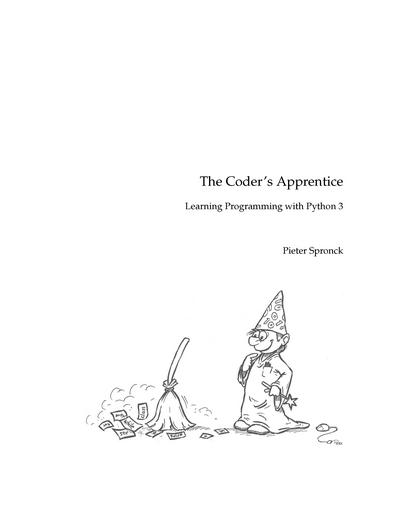
The Coder’s Apprentice - Learning Programming with Python 3
"The Coder's Apprentice" is a course book, written by Pieter Spronck, that is aimed at teaching Python 3 to students and teenagers who are completely new to programming.
Publication date: 11 Nov 2017
ISBN-10: n/a
ISBN-13: n/a
Paperback: 398 pages
Views: 7,824
Type: Textbook
Publisher: n/a
License: Creative Commons Attribution-NonCommercial 3.0 Unported
Post time: 20 Feb 2021 01:00:00
The Coder’s Apprentice - Learning Programming with Python 3
 "The Coder's Apprentice" is a course book, written by Pieter Spronck, that is aimed at teaching Python 3 to students and teenagers who are completely new to programming.
"The Coder's Apprentice" is a course book, written by Pieter Spronck, that is aimed at teaching Python 3 to students and teenagers who are completely new to programming.
Publication date: 11 Nov 2017
ISBN-10: n/a
ISBN-13: n/a
Paperback: 398 pages
Views: 7,824
Document Type: Textbook
Publisher: n/a
License: Creative Commons Attribution-NonCommercial 3.0 Unported
Post time: 20 Feb 2021 01:00:00
Share — copy and redistribute the material in any medium or format
Adapt — remix, transform, and build upon the material
The licensor cannot revoke these freedoms as long as you follow the license terms.
Click here to read the full license.
Pieter Spronck wrote:...
...
In my view, any course program that does not make "computer programming" a required course, is doing its students a disservice, as it is not preparing them for the job market. Actually, I would prefer it if secondary, or even primary schools would incorporate such courses, as programming skills tend to be easier to learn at a younger age. The reason is that they need a particular way of creative thinking, which is harder to acquire when one is already used to solving problems in the reproductive ways that are normally taught at schools.
All students, regardless of their chosen topic, need to learn how to program. Not because we should raise a generation of computer programmers – professional programming is a specialization that only a few people need to be able to do. But the ability to create programs provides students with the skills to think and solve problems like a computer programmer, to gain insight in the possibilities and limitations of computers, and to leverage the power of computers in a particular domain in a uniquely human way.
The goal of this book is to teach anyone how to create useful programs in Python. It should be usable by secondary school students, and university and college students for whom computer programming is not naturally incorporated in their course program. Its aim is to give anyone the means to become proficient in programming, and as such get prepared to perform well in the 21st century job market.
More Resources:
The book's webpage
Tweet
About The Author(s)
Pieter Spronck studied computer science at Delft University of Technology, and received a PhD in Artificial Intelligence from Maastricht University. He held jobs as a programmer, systems designer, and knowledge engineer, before entering academics. He has worked for Tilburg University since 2008. Since 2016 he is a full professor of computer science, and since 2018 he heads the Department of Cognitive Science and Artificial Intelligence of the Tilburg School of Humanities and Digital Sciences. He teaches programming and artificial intelligence. His research interests include evolutionary systems, adaptive control, computer game AI, player modeling, multi-agent systems, knowledge technology, and serious games. These interests are grounded in the fields of computer science, artificial intelligence, and data science.

Pieter Spronck studied computer science at Delft University of Technology, and received a PhD in Artificial Intelligence from Maastricht University. He held jobs as a programmer, systems designer, and knowledge engineer, before entering academics. He has worked for Tilburg University since 2008. Since 2016 he is a full professor of computer science, and since 2018 he heads the Department of Cognitive Science and Artificial Intelligence of the Tilburg School of Humanities and Digital Sciences. He teaches programming and artificial intelligence. His research interests include evolutionary systems, adaptive control, computer game AI, player modeling, multi-agent systems, knowledge technology, and serious games. These interests are grounded in the fields of computer science, artificial intelligence, and data science.